What do candidates on the BS 7909 course actually do?
The course on BS 7909 is often 'tuned' to suit the audience on the day, (dealing with mixtures of production managers and electrical engineers, for example) and our instructors promote discussion of the topics within the Standard that interest the candidates. In the following we have shown the instructor's version of the course notes which include various additional comments that the candidates wouldn't necessarily need to know but are interesting to us.
We begin by learning about the background technical issues to ensure that all the candidates can understand what the requirements of BS7909 are intended to achieve. We look at what voltages might exist on the incoming supply in typical circumstances and then get them to see that the earth and neutral are probably not going to be at zero volts: important because this issue drives many of the requirements of the Standard. We study the effects of electric shock and the other dangers of electricity: short circuits, overloads, earth faults and polarity reversals.
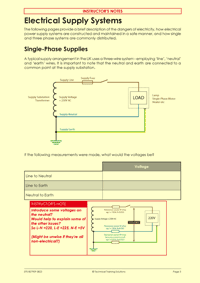 |
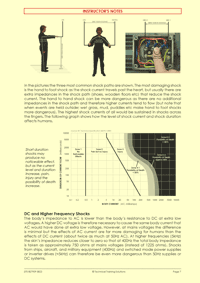 |
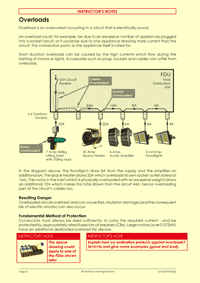 |
This is page 5 of the course notes for the BS7909 course, examining the incoming supply voltages |
This is page 7 of the course notes for the BS7909 course, looking at the effects of electric shock |
This is page 8 - analysing the dangers of overloads |
We then look at the various supply systems that are used (TN-S etc), and discuss their merits. We look at bonding, basic protection and IP codes and how these issues relate to temporary systems. We look at the commonly used fuses and circuit breakers and get the candidates to look at the fuse and circuity breaker technical characteristics so that they can see that (for example) a 16A fuse or circuit breaker won't operate instantly when 17A passes through it.
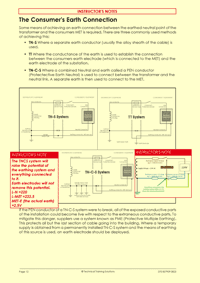 |
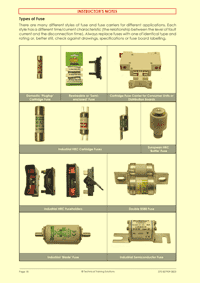 |
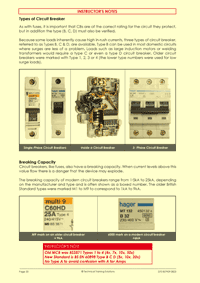 |
This is page 12 of the course notes for the BS7909 course, looking at the various supply systems |
This is page 18 of the course notes for the BS7909 course, showing the common fuse types available |
This is page 20 - showing some of the commonly-used circuit breakers |
The Standard calls for certain types of RCD to be used so we look at these and show how they work, what faults they would operate on and which faults they wouldn't. It's also important for the candidates to understand how voltage drop can cause issues (we get them to calculate the voltage drop in a given scenario and decide if this drop is compliant or not). The earth fault loop impedance plays an important part in the safety of temporary systems and we show how this affects the earth fault current and consequently from their previous learning about the technical characteristics of fuses and circuit breakers they can see that the Zs will determine the disconnection time under fault conditions.
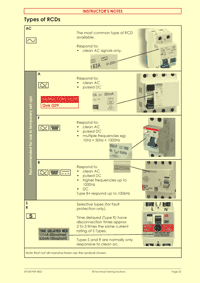 |
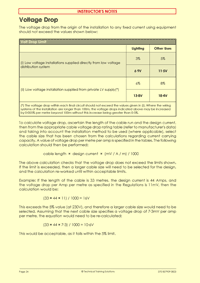 |
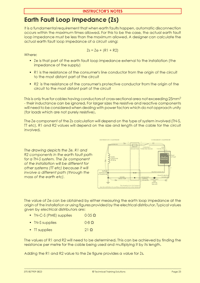 |
Page 23 - the various types of RCD that are available |
Page 24 - the voltage drop limits and how the actual voltage drop could be calculated |
Page 25 - earth fault loop impedance and how it determines disconnection times |
Throughout this early part of the day we make constant reference to how these issues impact on temporary systems. We can of course delve into the technical issues when candidates have strong electrical backgrounds but for non-electrical candidates we avoid getting too technical. The next section of the course begins by showing what a temporary system might physically look like (and we can show how voltage drop, earth loop impedance and prospective fault currents would alter around this system).
The legal implications are important: We analyse the legislative links between the Health & Safety at Work Act, the Electricity at Work Regulations, the Wiring regulations and the Standard itself. Candidates learn about the relationships between each of these. Candidates are engaged in this part of the course by exploring the various scenarios that might arise - for example: Would non-compliance with BS 7909 be a criminal or a civil offence? In what situations would compliance with BS 7909 be necessary? Would a defence be needed to prove compliance with the Standard? This analysis of the legal situation helps the candidates to clearly see the scope of the Standard - to whom, where, what and when it applies.
The Standard defines and describes the components used in temporary systems. We discuss the more interesting ones of these.
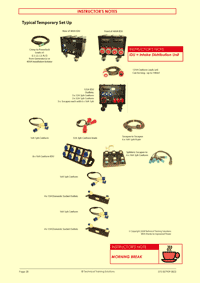 |
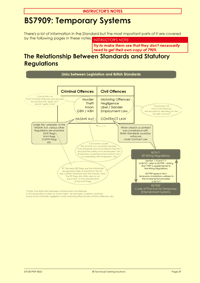 |
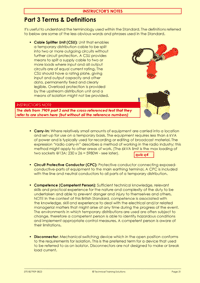 |
Page 28 - a typical temporary set-up |
Page 29 - the legal issues |
Page 31 - component definitions |
We then look at other interesting components like IDUs, KSPCs and their various requirements. We explain the important issue of selectivity and how this can be achieved with fuses, circuit breakers and RCDs. The Standard sets management requirements for temporary systems and we look at how the person responsible should be selected in small and large events (and how this differs).
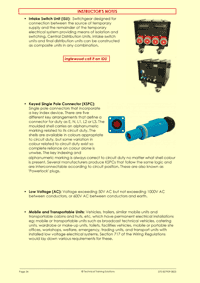 |
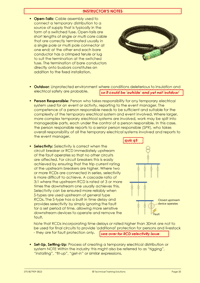 |
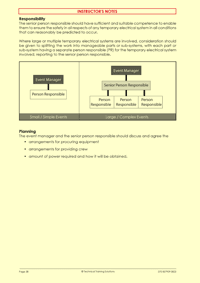 |
This is page 34 of the course notes for the BS7909 course, showing the definitions of KSPCs and IDUs in the Standard. Candidates discuss what each of these terms mean |
This is page 35 of the course notes for the BS7909 course, describing the requirements for open tails and how selectivity is achieved in electrical installations |
This is page 38 of the course notes for the BS7909 course, looking at the management requirements for events |
The course goes on to look at the requirements of small/simple events and this is contrasted with the requirements for large/complex events. We then look at the requirements for design and setting-up of temporary electrical systems to BS 7909. We look at the various connectors that are required and study the circumstances in which they can be used.
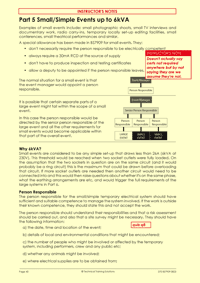 |
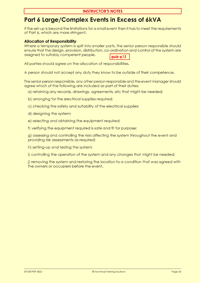 |
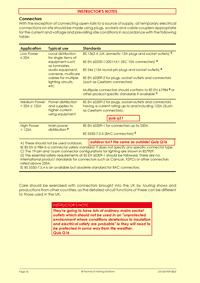 |
This is page 40 of the course notes for the BS7909 course, describing the requirements for small/simple events |
This is the page 43 of the course notes for the BS7909 course, describing the requirements for large/complex events |
This is the page 52 of the course notes for the BS7909 course, discussing the connectors that are to be used and the circumstances in which they can't. |
When temporary systems are powered from an existing building's supply that supply will need to be checked before it can be used and we look at the requirements for that. We look carefully at the need for inspection and testing recommended by BS 7909, and compare and contrast the requirements for small and large events. This helps us to focus on the problematic issues like unnecessary workload and the (often inadequate) time allowed to complete the paperwork etc to the fore, and we can then provide guidance on how best to alleviate these problems.
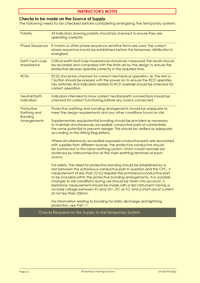 |
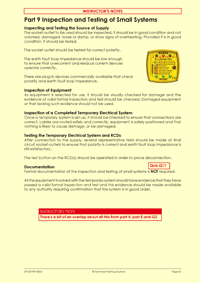 |
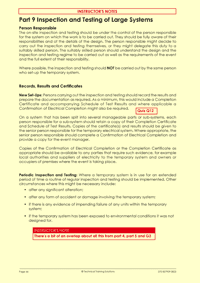 |
This is page 62 of the course notes for the BS7909 course, describing the requirements for inspection and testing of a fixed supply from an existing building |
This is page 65 of the course notes for the BS7909 course, describing the requirements for inspection and testing of small events |
This is page 66 of the course notes for the BS7909 course, describing the requirements for inspection and testing of large events |
The course finishes by summarising the main requirements of the Standard that have been taught and reminding the candidates what they should have learned from them.
In order to ensure that the candidates have understood each of the key objectives of the course properly, we issue a multiple-choice assessment paper which they have to answer and return to our instructor. The instructor then fully debriefs each and every question, ensuring that every single candidate has understood all of the important points of the day.
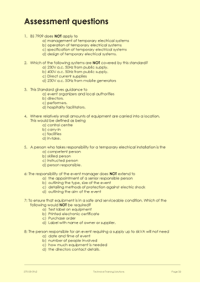 |
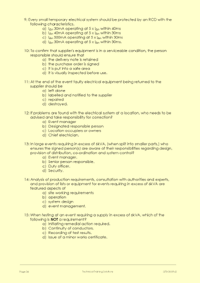 |
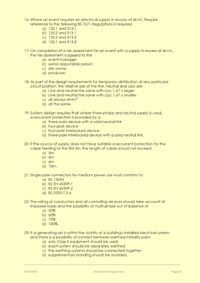 |
The multiple-choice assessment paper used on the BS7909 course |
||
If you would like to learn more about the course on BS7909 - Temporary Electrical Installation then please call us.


